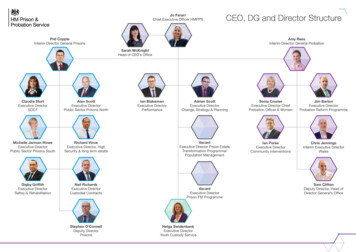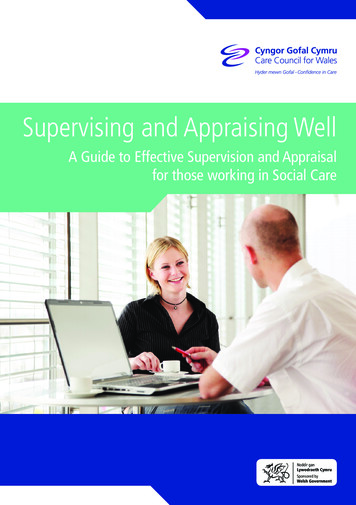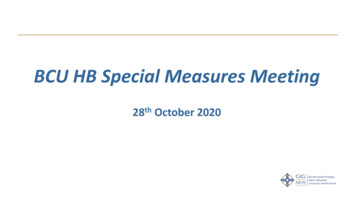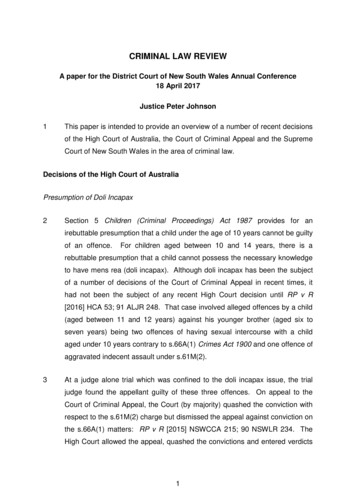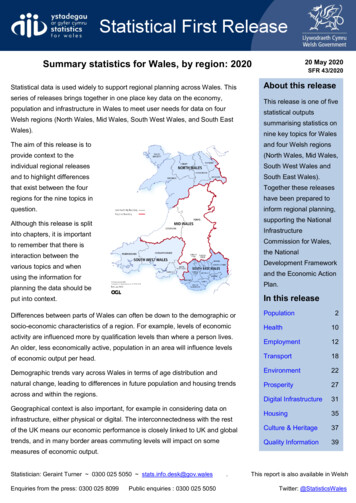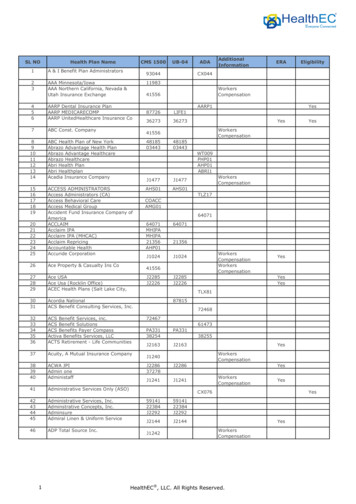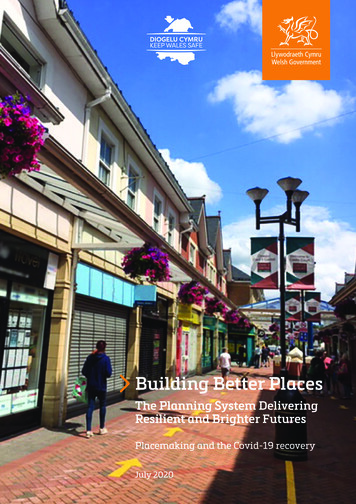
Transcription
Building Better PlacesThe Planning System DeliveringResilient and Brighter FuturesPlacemaking and the Covid-19 recoveryJuly 2020
BuildingBuilding BetterBetter Places:Places: TheThe PlanningPlanning SystemSystem DeliveringDelivering ResilientResilient andand BrighterBrighter FuturesFuturesForeword from the MinisterThe Covid-19 Pandemic and our collectiveresponse to the issues it raises, is one of the mostcomplicated challenges in a generation. We haveall had to do things differently, think more aboutour actions, and act carefully and sensitively tothose around us.The economic consequences of the pandemic arepredicted to be severe, with impacts felt across allsectors, including those in construction and thebuilt environment.As we slowly emerge from this crisis, we mustrecognise the needs of our communities andensure that we retain the best elements of thechanges that have occurred around us, includinghow we have behaved and responded. We needan environmental, social, cultural and economicrecovery which is sustainable.Digital ISBN 978-1-80038-867-3WG40750 Crown copyright 2019Mae’r ddogfen yma hefyd ar gael yn Gymraeg. / This document is also available in Welsh.We have all spent more time in ourneighbourhoods during the weeks of lockdownand we can all appreciate the difference betweenhaving a quality environment to live, work andrelax in and how being cut-off from our friendsand family can mean that a poor environment,with no or limited access to local goods, servicesand green spaces can have a severely detrimentalimpact on our mental and physical health andwell-being, as well as our ability to protectour livelihoods.decarbonisation and social justice at its heartwhich respects our environment, whilst givingpeople good places to live in, which are accessibleon foot, bike and public transport.Planning Policy Wales (PPW 10) leads the wayin this respect and contains the principles andpolicies needed for us to recover from this situationin a positive manner, putting placemaking at theheart of future development. This guide pinpointsthe most relevant policy priorities and actions to aidin the recovery.This cannot be done by us working alone. Thedevelopment industry, local planning authorities,public bodies, the third sector and the WelshGovernment, need to work together to achievethis, recognising that change is needed. We cangrasp this opportunity if we are all committed tothe delivery of high-quality development in theright place.I am committed to ensuring that the WelshGovernment plays its role in supporting thevibrancy of places and helping thispeople-focussed and placemaking-led recovery.This document starts to identify action to achievethis and upon which we must build. We all haveour part to play to ensure that the communities oftomorrow benefit from the foresight of today.Now, more than ever, we need to think aboutplaces and placemaking. This will be our corevalue in the work we take forward to bring aboutrecovery in Wales. The regenerative action wetake at all levels will be driven by integratedthinking and not short-term expedience which canhave negative longer term consequences.Even in this time of economic hardship for manyin the development industry, we cannot fall backon quick-build, poor quality development on siteswhich are not sustainable. We must learn fromthe past and ensure that a post Covid world haspeople’s well-being at its heart.This is a once-in-a-generation opportunity forus to reset the clock and think again about theplaces we want to live, work and play in. Weneed to rebuild a greener, cleaner society withJulie James MSMinister for Housing and Local Government2
BuildingPlacemakingBetterandPlaces:the Covid-19The PlanningrecoverySystem Delivering Resilient and Brighter FuturesIntroductionThis document sets out the Welsh Government’s planning policy priorities to assist in taking action in therecovery period after the Covid-19 pandemic crisis. The planning system should be centre stage in theconsideration of built and natural environment issues that have arisen from this situation.Planners have a forward looking and key,co-ordinating role. This is not just about thestatutory functions of local planning authorities.Planners’ skills mean that they can be proactiveat the implementation of policies to aid inthe recovery period, identifying opportunities,and bringing people together. Planners areuniquely placed to think systemically and workstrategically, to shape the vision for betterplaces and lead positive change.The Welsh Government will play its role inleading and supporting this agenda. We willuse all our powers to reject poor developmentproposals through the notification directionprocedures or our role in commenting on localdevelopment plan strategies, policies andallocations which do not support placemaking.We will also encourage early, positiveengagement on proposals and plans and useour resources to inspire good practice.In this paper we highlight the key existingplanning policies and tools which shouldbe used by all sectors in the environmental,social, cultural and economic recovery ofWales, recognising the continuing need forPlanners to operate within a wider context ofpriorities and action at all scales.In this respect, the development industry alsohas its part to play in improving the designand quality of schemes being presented tothe planning system. Asking ourselves, “CouldI live my whole life here? Will this place meetmy needs and that of future generations?”is a good first test. This is then followed bymeaningful engagement with communities andthe local planning authority on the design ofa scheme. Finally, a commitment to followingthrough on infrastructure obligations will go along way in ensuring that the developmentsenvisioned are delivered and the wider publicbenefits are maximised.The Welsh Government’s policy directiontowards better places and placemaking hasnot changed. In fact, the pandemic crisis hashighlighted the need for good quality places forpeople to live, work and relax in. It has furtheremphasised how important the quality of ourliving and working environments are and howmuch more they matter as we require moreflexibility to support new working, living andlearning needs. Whilst there is undoubtedlya need for economic recovery, which theplanning system should facilitate, this shouldnot be at the expense of quality, both in termsof health and well-being and in response to theclimate and nature emergencies.Local planning authorities should be boldin their visions for the future which they setout in their local development plans. Plansshould not roll forward unsustainable spatialstrategies or be identical to neighbouringauthorities’ plans, rather they should activelyembrace the placemaking agenda set out inPPW. Each plan should be unique to an area,identifying its character, strengths and areaswhich need improving and set out policieswhich improve these.If we forego our policy commitment to quality,we risk repeating previous errors in allowingdevelopment on unsustainable sites in areaswhich did not have the infrastructure orconnections to enable us to live active, healthylives and promote better well-beingin every sense.3
Building Better Places: The Planning System Delivering Resilient and Brighter FuturesWelsh Government Policy SupportWelsh Government planning policy officials, withexperience and knowledge in a range of policyareas, can provide direct assistance to localplanning authorities in terms of policy support,making connections with internalWelsh Government colleagues, and bringingtogether policy makers to share ideas, encourageinnovation and provide support.Please contact us directly: PlanningPolicy@gov.wales4
8PlacemakingPlacemaking andand thethe Covid-19Covid-19 recoveryrecoveryOur Commitment to Better Places,Placemaking, Quality Outcomesand Good DesignGood places are the result of good planning which fully embraces placemaking.Taking a placemaking approach has multiple benefits which not only helps improve quality of life,but also helps us to tackle climate change, reduce our carbon footprint and improve biodiversity andecological resilience for the future. Our legal obligations under the Environment and Well-being ofFuture Generations Acts must be recognised and our actions must not be diluted.The National Sustainable Placemaking Outcomes are set out in PPW and are highly relevant at this time.Creating and SustainingCommunitiesGrowing Our Economyin a Sustainable MannerEnables the Welsh language to thriveFosters economic activityAppropriate development densitiesEnables easy communicationHomes and jobs to meet society’s needsGenerates its own renewable energyA mix of usesVibrant and dynamicOffers cultural experiencesAdaptive to changeCommunity based facilities and servicesEmbraces smart and innovative technologyMaking Best Use of ResourcesMakes best use of natural vents wastePrioritises the use of previously developedland and existing buildingsUnlocks potential and regeneratesHigh quality and built to lastMaximising Environmental Protectionand Limiting Environmental ImpactFacilitating Accessibleand Healthy EnvironmentsResilient biodiversity and ecosystemsAccessible and high quality green spaceDistinctive and special landscapesAccessible by means of active traveland public transportIntegrated green infrastructureAppropriate soundscapesReduces environmental risksManages water resources naturallyClean airReduces overall pollutionNot car dependentMinimises the need to travelProvides equality of accessFeels safe and inclusiveSupports a diverse populationResilient to climate changeGood connectionsDistinctive and special historic environmentsConvenient access to goods and servicesPromotes physical and mental health and well-beingPlacemaking occurs at the strategic and local levels, through the development plan process anddevelopment management decisions; each with their own part to play. Planners have a role beyond thestatutory processes to engage with the implementation of plans to ensure that the national placemakingoutcomes are achieved in practice. The skills Planners possess can help make change occur.5
Building Better Places: The Planning System Delivering Resilient and Brighter FuturesDesign Commission for Wales AssistanceThe Welsh Government sponsors the DesignCommission for Wales (DCFW) which helpslocal planning authorities, design teams anddevelopers to deliver better places throughgood design.DCFW provides client services for the development of briefs with a focus onplacemaking and the application of exemplary policy in practice. It providestraining and a free design review service for all sectors. The Commission’sservices are available throughout Wales, online and in person.We are working with DCFW on the formulation of a specific strategicdesign review service for local development plans to ensure that strategicplacemaking decisions help achieve the best outcomes.Early engagement with DCFW is encouraged to get the most effective support.Contact: connect@dcfw.org and 029 2045 1964.6
Placemaking and the Covid-19 recoveryFor some issues a regional level ofconsideration is needed. The LocalGovernment Elections Bill will mandate thepreparation of a Strategic Development Plan(SDP) in each of the four regions in Walesthrough a Corporate Joint Committee (CJC).Local Development PlansThe Covid-19 response means that we needto plan effectively for future crises and takea long-term view to improve health and wellbeing for all. In the planning system it is ourlocal development plans (LDPs) which do thisthe best.The Welsh Government will use its engagementwith local planning authorities to focus on theissues raised in this document as a basis forour comments on draft policies and proposals.We expect to see innovation and creativity indevelopment plans to achieve better places.We encourage new ideas in policy formulationthat build on evidence and informationwhich exists and applies or adapts it to localcircumstances. Whilst the sharing of goodpractice amongst plan making is a good useof resources, it should not produce identicalplans to be used in a variety of distinctlocations. A placemaking approach demandstruly local planning strategies, policiesand approaches.Up to date LDPs are needed to urgently givelocal effect to local development prioritiesand national planning policy. They should beproduced or replaced as efficiently as possibleonce local planning authorities are able to.However, this does not mean that they shouldroll forward policies or proposals on sites whichdo not encourage good places. They should bedistinctive, with a truly local feel and dimension tothem which provide a strategic framework for thedevelopment of local areas, whilst responding tothe opportunity provided by national policy andlegislation. PPW provides extensive guidance onthe evidence needed to support policies throughthe plan making process; evidence can bewide ranging, be from existing sources and notnecessarily be specifically commissioned for planmaking purposes.Further guidance on the preparation ofLDPs can be found in the DevelopmentPlans Manual1.Whilst a local development plan needs toreflect national policy, the focus should be onlocal s-manual-edition-3-march-20207
Building Better Places: The Planning System Delivering Resilient and Brighter FuturesNational Development FrameworkThe Welsh Government is expecting topublish the first NDF early in 2021.The pandemic has delayed the processby approximately four months. A nationalspatial development plan is essential tohelp shape the recovery by addressingcomprehensively social, economic andenvironmental inequality.We intend to make a number of changes to the draft NDF based on theresponses to the consultation in 2019. We will be inviting the Senedd toscrutinise these changes in the autumn, when we will also publish a consultationreport showing how we took the responses into account.The pause in the process has been an opportunity to reflect on the draft NDFand consider how well suited it is to shaping our recovery from Covid-19. Overall,we feel the draft NDF stands up well to emerging challenges and opportunities,with its priorities for decarbonisation, cohesive communities, vibrant towncentres and green infrastructure. The spatial policies support growth in cityregions, in a number of regionally important towns and coastal communities inall regions (the type of places that research suggests may suffer economically asa result of Covid-19) and they support strong, resilient rural areas. Some of thechanges we were already planning to make will be particularly important in areaslike active travel and digital infrastructure.The publication of the NDF will fill an important missing part of the planningpolicy jigsaw. It will give clarity on the spatial priorities of the Welsh Governmentand the issues we believe to be nationally important. Having the NDF in placewill help inform the delivery of Strategic Development Plans through the newCorporate Joint Committees (see above). Supporting stronger regional workingwill allow LDPs to focus on the locally distinctive issues, and the patterns, trendsand sites that need attention.The NDF will help make LDPs more ambitious and creative; the NDF itselfwill be part of the evidence base, so less time will need to be spent compilingbackground papers and more time and effort can go into discussions withcommunities and developers, and the important work of making better placeslocally. The recovery from Covid-19 is a part of that task. Through the NDF theWelsh Government will support sustainable schemes that help areas to recover,be more resilient and to thrive following this pandemic.We know the NDF will be a big change for our planning system, we’re lookingforward to implementing it with our partners so that it helps achieve positivechange in all parts of the country.8
Placemaking and the Covid-19 recoveryan LDP is silent or out-of-date on an issue.The Welsh Government will support decisionstaken in this context, particularly in theshort-term until an LDP is adopted.Development ManagementThe Covid-19 situation has demonstrated thatdecisions can be taken quickly and effectivelywhilst thinking about the well-being and safetyof people. This should continue to be the casefor the Development Management process aswe begin to return to normal operation of theplanning system.Relevant material considerations should stillbe used in this process to both approve andrefuse applications which do not demonstrategood placemaking. Decision makers shouldconsider widely what is material to aparticular application and apply this to theirconsiderations, particularly where the outcomewill be a benefit to creating better placesWhilst the Welsh Government is consideringwhat amendments are needed to permitteddevelopment rights to assist the recovery, itwill not be doing this at the expense of makinggood places. Development managementdecisions should focus on creating healthy,thriving active places with a focus on a positive,sustainable future for our communities.The Welsh Government will support thisapproach wherever it can be demonstrated tobe of benefit to communities, whilst makingthe decision making process as effectiveas possible.PPW and the NDF can be used directly in thedecision-making process, particularly where9
Building Better Places: The Planning System Delivering Resilient and Brighter FuturesPlacemaking WalesPlacemaking Wales is a new partnership of organisations involved in thebuilt environment coming together to help deliver quality across the sector topromote better outcomes for all.The initial phases of work includes the creation of a charter where theorganisations involved commit to promoting placemaking in their work orpledge to deliver it.Future stages of work include the provision of relevant training for Plannersand other professionals, the sharing of good practice and the creation ofguidance and resources on specific aspects of placemaking.Placemaking Wales will be launched by the Minister for Housing and LocalGovernment shortly and will be accompanied by a short placemaking guidewith case studies.If you would like to know more or get involved contact the Welsh GovernmentPlanning Division: PlanningPolicy@gov.wales10
Placemaking and the Covid-19 recoveryPPW states that the sustainable transporthierarchy should be used to reduce the needto travel, prevent car-dependent developmentsin unsustainable locations, and support thedelivery of schemes located, designed andsupported by infrastructure which prioritisesaccess and movement by active andsustainable transport.Climate Change andDecarbonisationLast year the Welsh Government and manylocal authorities declared a climate emergency.The severe storms and flooding that afflictedso many communities across Wales earlier thisyear came as a stark reminder of the urgencythat is required to combat climate change andadapt to its effects.Other relevant PPW policy areas relating totackling climate change and making moreresilient places include:Edition 10 of PPW was published shortly beforethe declaration of a climate emergency. PPWclarifies that the purpose of the planningsystem is to build sustainable places thatpositively contribute towards the health andwell-being of current and future generations.This is directly relevant to the climateemergency, with PPW setting out an ambitiousand comprehensive policy framework forplanning authorities to address the causes andeffects of climate change. the importance of Ultra Low EmissionVehicles (ULEVs), which includes electricvehicles, in the decarbonisationof transport; a requirement for local planning authoritiesto establish targets for renewable energygeneration in development plans, as wellas to identify spatial areas whererenewable energy developments willbe permitted; severely restricting the extraction of newfossil fuels; ensuring biodiversity enhancement (a netbenefit for biodiversity), ecosystemresilience and green infrastructure as partof advocating nature-based solutions; taking forward measures to embed theprinciples of a circular economy,particularly in the construction, and use,of the built environment and land, andthe sustainable management of mineralresources; andA strategic role for the planning system isto direct growth to sustainable locationsand prevent the creation of car-dependentdevelopments. This is a key principle in PPWand is supported by the sustainable transporthierarchy, which prioritises walking, cycling andpublic transport ahead of private motor vehicles. directing development away from areas atrisk of flooding.The key message is that a plan-led approach isthe most effective way for the planning systemto combat climate change. We must identify,plan for and achieve key steps in achieving theswitch to a decarbonised and climateresilient society.11
Building Better Places: The Planning System Delivering Resilient and Brighter Futureshealth boards, will help to secure a betterunderstanding of health inequalities and theirconsequences. This informs the production ofLDPs which can set local policies to ensure theopportunities and benefits are delivered onthe ground.Considering Health and Well-beingthroughout the Planning ProcessThe Covid-19 crisis has emphasised theimportance of considering health and wellbeing throughout the planning system toensure communities across Wales are healthy,vibrant and inclusive.There are a variety of tools at different scaleswithin the planning system that can help usto better understand health and well-being.For example, Health Impact Assessments,which some local planning authorities alreadyundertake, are one tool that look to ensureplans, policies and proposed allocations are assustainable as possible.The planning system has an important role insupporting healthier lifestyles and reducinginequalities. This includes both direct andindirect opportunities such as the allocationof land for health facilities, ensuring gooddesign and barrier free development, jobs andskills, improving air quality, soundscapes andprotecting and improving access to recreationand natural green spaces. These can provideboth physical and mental health benefits,improve well-being and help to reduce inequality.Health and well-being considerations arewoven throughout PPW. Further guidanceon how to embed these considerations intoplanning can be found in Health ImpactAssessment. A practical guide2, Planning forbetter health and well-being in Wales3 andCreating healthier places and spaces for ourpresent and future generations.Many factors and interactions affect healthand well-being. Therefore, involvement andengagement with other partners, such as les/1415/0710/5107/HIA Tool Kit V2 les/2915/3243/8664/planning for health and wellbeing in wales.pdf12
Placemaking and the Covid-19 recoveryPriorities and Actions forPlaces - Post Covid-19ConsiderationsPPW contains policy statements from theWelsh Government on a variety of planningissues and topics; which remain relevant andshould be considered as a whole by localplanning authorities and the developmentsectors. However, in the immediate postCovid-19 phase there will be particularareas of policy which should be the focus ofconsideration and action, in order to act asa catalyst for a recovery across the pillars ofsustainable development.PPW demonstrates that policy areas work moreeffectively when they are considered togetherin order to get the maximum benefit. We havetherefore identified key issues which bringindividual policy areas together to ensure thataction is the most effective. The 8 issues are:These considerations fall in to one ofthree categories: Digital places ‒ the lockdown lifeline1.2.3. Staying local: creating neighbourhoods Active travel: exercise and rediscoveredtransport methods Revitalising our town centres Changing working practices: our futureneed for employment landHow we experienced the direct impactsof the Covid-19 lockdown period and thepermanent positive changes we need tosee in places and as part of newdevelopment. Reawakening Wales’ tourism andcultural sectors Green infrastructure, health andwell-being and ecological resilienceThe lessons we have learned over thistime and how we can help to makeplaces more resilient and adaptable tofuture pandemics, should theyhappen again. Improving air quality and soundscapes forbetter health and well-beingEach issue draws out the pertinent points ofPPW with commentary on specific aspects of thepotential post Covid-19 pandemic situation.Aiding the recovery after the pandemichas passed and restrictions are eased toensure it benefits all parts of society andhelps us to decarbonise, tackle climatechange, reverse biodiversity decline andimprove health and general well-being.Through effective planning we can create amore resilient Wales where social, economicand environmental inequalities are identifiedand effectively addressed to create a moreresilient and brighter future for all. This is aonce in a generation opportunity for planningto have a positive effect on the future wellbeing of people in Wales and these policyconsiderations should be applied immediatelyto ensure we affect change in the most positiveway possible.13
Building Better Places: The Planning System Delivering Resilient and Brighter Futuresrecovery and social cohesion. With uncertaintyover the impact of the pandemic on theeconomy and jobs and associated ability toenter the housing market, we must increasehousing output by refocussing on buildingnew social housing and ensuring that roughsleepers do not return to the streets.Staying local: creatingneighbourhoodsCovid-19 is having a significant impact onour communities and how we live our lives.Through the Covid-19 crisis we have all beenspending more time at home and within ourlocal neighbourhoods which has highlightedthe importance of where we live and thequality of the environment around us. Thecrisis has also placed additional emphasis onthe importance of well located, secure andaffordable homes for people’s health andwell-being.The planning system’s most important role is inguiding how places grow and evolve. SDPs andLDPs have a fundamental role in directing newdevelopment, especially housing, to the rightlocations. Forward planning can also establishkey factors to the success of a place, such asthe mix of uses, types of housing (includingsocial housing), proximity to facilities andpublic transport, density, the street networkand access to greenspace and nature. Theseare key aspects of placemaking, which arereflected throughout PPW, with specific policyand guidance in the strategic placemaking andhousing sections.The location, quality, size and features ofour homes has influenced how we managedthrough the lockdown. The quality, flexibilityand adaptability of our built environmenthas had a huge impact on how we providehealthcare and education, food and medicalsupplies. During this time we have alsoseen the importance of local services andinfrastructure with people spending more timein their local neighbourhoods. The continuationof people working from home and more locallyis expected to be a long-term trend. We needto plan for these trends and, even more thanbefore, ensure we are building homes andneighbourhoods that are great places to live,with easy access to services and appropriateinfrastructure and greenspace.We will expect proposals for new communities(in rural and urban areas) and housingsites to integrate with existing services andinfrastructure and, where extra provisionis required as a result of the development,for this to be forthcoming. Creativity andinnovation will be required in order for variousagencies, infrastructure partners and publicsector providers to come together to delivertruly sustainable sites. This provision shouldbe identified at the earliest opportunity withrelevant information available to communitiesduring meaningful engagementand consultation.Local food production and supply chainshave become very important in some areas,with the growing popularity of allotmentsseeing us grow our own food more. Thishas been coupled with entrepreneurialspirit which has seen communities comingtogether to distribute this food and supportlocal businesses in difficult economic times.We must support this localism through theplanning system by identifying communitygrowing spaces, as well as protecting our Bestand Most Versatile Agricultural (BMV) landfrom development.As a spatial plan for addressing the keynational priorities in Wales to 2040, the NDFwill provide evidence of the need for housingat both a national and regional level and itwill demonstrate the necessity for a focus onincreasing the delivery of affordable homes.To support the growth strategy of the NDF,new guidance will be prepared to assist localplanning authorities shape the growth andregeneration of their towns and cities. This willexpand on strategic placemaking principles inthe NDF and provide guidance on developing aspatial framework to guide growthand regeneration.Enabling people to live in well-located andwell-designed energy efficient homes is a keyrole for planning. House-building is also animportant part of the Welsh economy anddelivering new social and market homes canmake a significant contribution to economic14
Placemaking and the Covid-19 recoveryLocal Development Orders (LDOs)LDOs grant planning permission for certain types of development within aspecified area, subject to conditions and limitations. A LDO can contribute tolocal economic development and regeneration, helping make places moreattractive and competitive. They simplify the planning process by removingthe need for planning applications, allowing developers to progress w
towards better places and placemaking has not changed. In fact, the pandemic crisis has highlighted the need for good quality places for people to live, work and relax in. It has further emphasised how important the quality of our living and working environm

